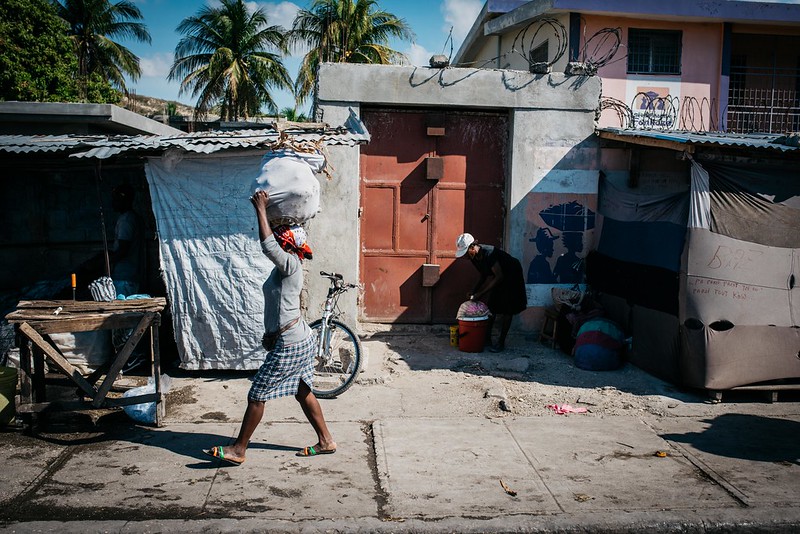Project HOPE: Primary Care Amid Haiti’s Health Care Crisis
 As the largest island in the western Atlantic, Haiti lies at the core of the Caribbean hurricane belt. Its treeless landscape amplifies its susceptibility to natural disasters, making it particularly prone to cyclones, floods, droughts and landslides. With a population of roughly 11.4 million, these environmental hazards pose significant risks to more than 96% of the island’s residents. Project HOPE radiates a beacon of hope across oceans with its unwavering commitment to tackling some of the globe’s most pressing public health challenges.
As the largest island in the western Atlantic, Haiti lies at the core of the Caribbean hurricane belt. Its treeless landscape amplifies its susceptibility to natural disasters, making it particularly prone to cyclones, floods, droughts and landslides. With a population of roughly 11.4 million, these environmental hazards pose significant risks to more than 96% of the island’s residents. Project HOPE radiates a beacon of hope across oceans with its unwavering commitment to tackling some of the globe’s most pressing public health challenges.
Haiti: A Brief History of Health Care Challenges
Since the ’80s, Project HOPE has been dedicated to aiding the people of Haiti, encompassing initiatives in maternal and child health alongside emergency interventions. Through its swift mobilization of emergency relief efforts and sustained commitment, Project HOPE has played a pivotal role in facilitating the recovery of Haiti’s health care system for enduring resilience.
The organization remains unwavering in its dedication to fortifying Haiti’s fragile health care infrastructure amid the island’s tumultuous history and prevailing struggles. As a steadfast ally, Project HOPE extends a lifeline of aid to a nation teetering on the brink of a humanitarian crisis.
Natural Disasters
The catastrophic 2010 earthquake, which claimed the lives of more than 300,000 people and obliterated 60% of the health care facilities, continues to cast a long shadow over the Caribbean island. In 2016, Hurricane Matthew compounded the damages by decimating thousands of homes and vast swathes of the region’s farmland.
Cholera Outbreaks
Frequent floods and vulnerability to earthquakes have exacerbated cholera outbreaks on the island. The disease thrives in conditions of poor water quality, inadequate waste disposal and declining hygiene standards. According to Relief Web, more than 820,000 cholera cases were reported in Haiti between October 2010 and February 2019.
In 2022, another cholera outbreak prompted Project HOPE to take action. Its efforts included supplying clinics with essential water, sanitation, and hygiene (WASH) materials, distributing hygiene kits, and training community health workers. Additionally, in January 2023, the organization initiated a multi-sectoral program funded by the United States Agency for International Development (USAID) in response to the epidemic.
Since August 2021: Project Hope’s Impact
In recent years, the nonprofit organization has adapted its strategies to address the evolving needs of the community amid the rise of gang warfare. Haiti’s health care crisis extends far beyond its disaster-prone geography, deeply rooted in a tumultuous history of political turmoil and the pervasive presence of gangs. Recent reports indicate that approximately 80% of the capital city, Port-au-Prince, is now under gang control. This multifaceted crisis has resulted in hospitals being set ablaze, medical personnel facing targeted violence, widespread roadblocks disrupting health care access, soaring malnutrition rates and alarming increases in maternal and elderly mortality.
In May 2023, Project HOPE undertook a thorough assessment of Haiti’s Grand Sud region, uncovering significant findings. More than half of the participants reported journeys of an hour to access health care facilities, with limited financial resources identified as the main hindrance. Additionally, nearly half of the surveyed women lacked access to health service facilities for childbirth. It grappled with recurrent shortages of vital medications and deficiencies in staff training. Moreover, health facilities encountered challenges in reaching areas afflicted by high malnutrition rates due to the lack of mobile medical units.
Mobile Health Care Units: A Beacon of Hope
Project HOPE’s mobile medical units (MMUs) have emerged as indispensable assets, especially in areas controlled by gangs where access to traditional health facilities is hindered, exacerbating poverty and further impeding access to essential services. These MMUs have become lifelines for communities grappling with such challenges.
Transportation routes crippled by roadblocks have made it difficult for Haitians to reach health care centers and for facilities to acquire necessary medical supplies, fuels and pharmaceuticals. A surge in internal displacement, particularly from the capital toward the southern regions, has intensified the demand for assistance.
Amid understaffed, underfunded and underresourced health facilities, mobile clinics have played a crucial role in providing essential services to vulnerable and rural communities. These include protective services and hygiene promotion activities. Additionally, Project HOPE’s MMU offers medical consultations, prescriptions and care for mental health patients and victims of gender-based violence.
From October to December 2023, Project HOPE’s MMU operated almost daily, treating more than 45,000 patients in the Sud, Nippes and Grand’Anse departments. With sustained support from USAID, two mobile clinics will be held weekly in the Nippes department, ensuring access to vital health care services for the community.
– Irene Suvillaga
Photo: Flickr
